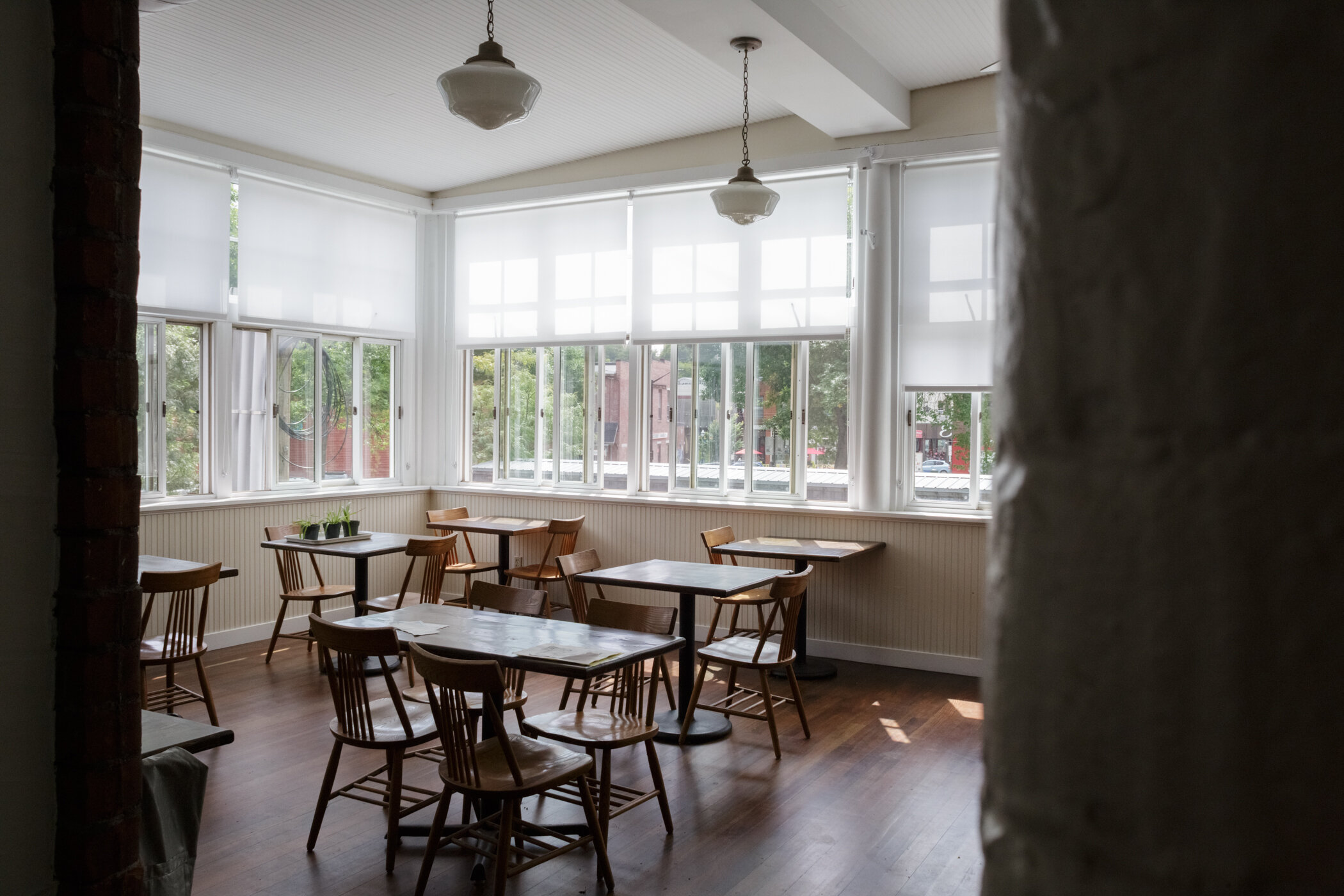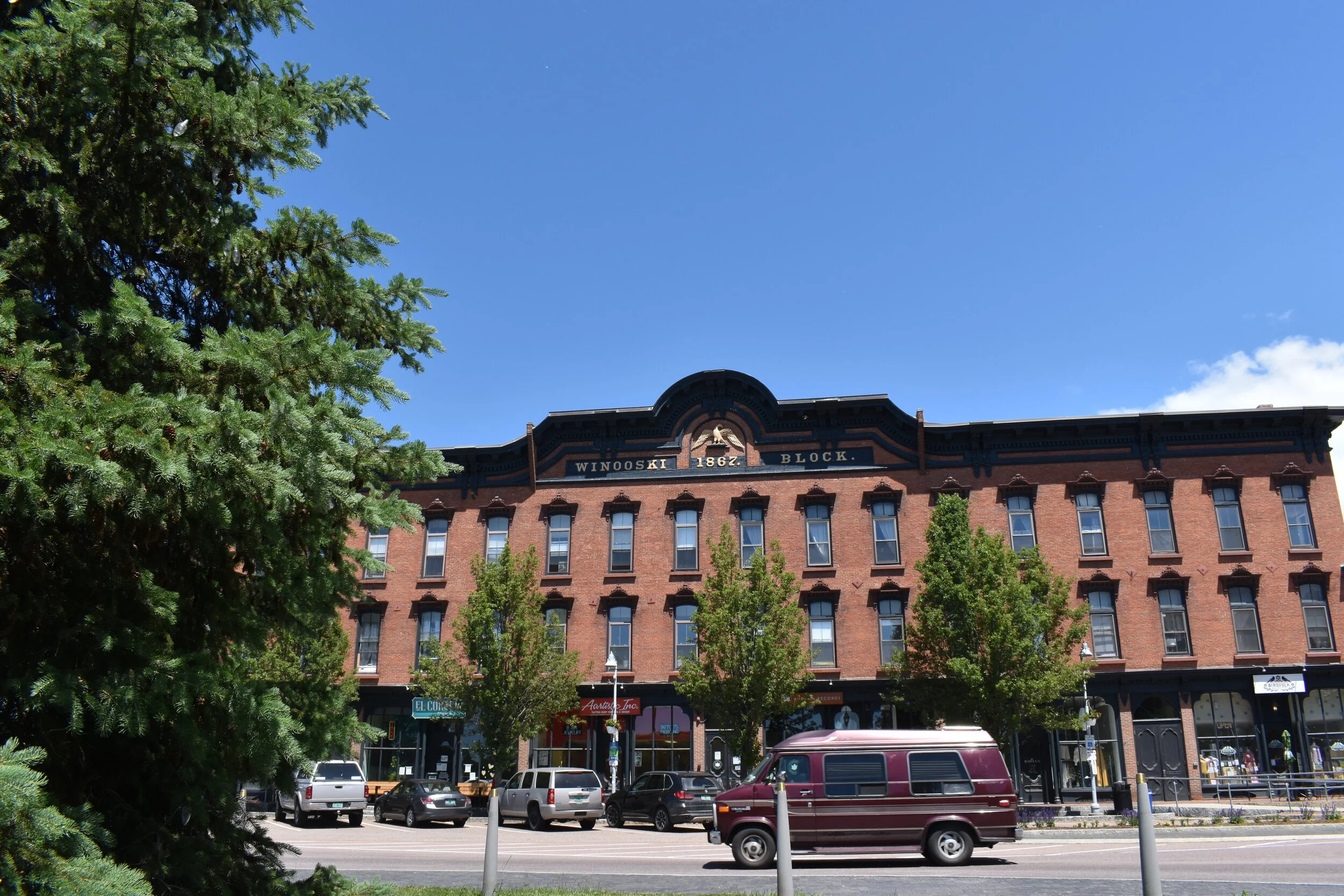Returning to Vermont Roots
Kiera Bratton-Lewis & Cory Bratton
Brattleboro, VT
Kiera and Cory outside their current home and the home that Cory grew up in Brattleboro, VT in late August.
“You’re going to need to figure something out,” Kiera Bratton-Lewis told her husband, Cory Bratton, over a phone call in early March. “It’s going to get bad.” She was referring to what was about to become the COVID-19 global pandemic and Cory’s newly renovated local Vermont restaurant, A Vermont Table.
Cory visits Walker Farm Stand in Putney, VT to pick up local, organic vegetables for the family meal he is catering from his restaurant, A Vermont Table. Photo by Anna Watts.
Three years ago, after taking over the farm-to-table catering company, which was then located in Putney, Cory had renovated his dream space in Brattleboro with two large kitchens —one for catering and one for dine-in— a bright, well-lit dining area, and a classic-style bar for cocktails and drinks. When Kiera called Cory in March, it had been three weeks since the restaurant’s official opening.
At the restaurant, which is set up with large kitchen space to accommodate both in-person dining and large catering orders, Cory now works on the day’s takeout catering order with a single staff member. Photo by Anna Watts.
After years working as a producer, writer, and director of indie films and documentaries in New York, Kiera was pursuing her dream of attending graduate school at the American Film Institute for screenwriting in Los Angeles. In early March, California was ahead of the East coast in the news about the coronavirus pandemic and Kiera was more worried than most, anxious about exposing her highly immuno-compromised mother in Brattleboro during her spring break trip to Vermont. In preparation, she strictly self-quarantined, avoiding even the roommates in her small LA apartment.
Corey blanches and seasons local green beans from Full Plate Farm in Putney for a family-sized catering order he received, cooked, and delivered as part of his restaurant, A Vermont Table.
Photos by Anna Watts.
On March 13th, as soon as classes were over, Kiera took a flight out of LA, dressed in two pairs of clothes, a plastic bag, a mask and a hairnet. “Everyone thought I was being crazy,” she said about her flight attire and self-imposed quarantine. “It was really lonely.” But she was adamant about protecting her mother and hometown from the potential of spreading the virus.
Cory works with a single staff member to prepare Saturday’s catering order at A Vermont Table. Photo by Anna Watts.
She arrived in Vermont with a new set of issues to face. Cory’s business relies heavily on its wedding season bookings, which are typically booked a year out and keep the catering company busy from spring to fall. By April, Cory was drowning in cancellations for the upcoming season. “It was a really tough time because they hadn’t put out any assistance,” said Cory. “I had to pay my bills.”
At home in Brattleboro, Kiera works on a screenplay she is writing under a tight deadline. Unsure of what the semester will hold, she will be starting school remotely from Vermont in early September. Photo by Anna Watts.
Growing up in Brattleboro, Kiera and Cory attended the same public elementary school. They were friends by high school and started dating in college. They both deeply valued the freedom that a childhood growing up in Vermont allowed. For Kiera, the pandemic has made this clearer than ever. “Vermont is the best place in the country to grow up right now. There are so many opportunities here to stay a child as long as possible. Especially now with social media, it’s so valuable to have spaces like this. I do imagine we’ll have kids in Vermont,” says Kiera, who has been previously ambivalent about whether to raise kids in Vermont, citing the lack of diversity. Growing up in Vermont, Kiera says, it’s not infrequent that out-of-towners assume she’s not from here, in spite of the fact that her father’s family has lived in Vermont for three generations.
Photo by Anna Watts.
These questions aside, the biggest hurdle the couple faces is how to survive. “The worst part about Vermont for young people is, ‘how do you make money?’ That’s why people leave,” says Cory, adding since his childhood he’s seen Brattleboro “shifting older, in general.” He’s had an unexpectedly difficult time finding electricians, plumbers, and other tradesmen to work on the restaurant construction. He understands that the limited supply of tradesmen will leave no replacements in the next generation.
Cory loads a takeout order into his car for delivery near Brattleboro’s main street and town center, where his restaurant, A Vermont Table, is located. Photo by Anna Watts.
Kiera sees a large disconnect between the new second homeowners moving to Brattleboro and the median income of the city, which lands at around $30,000 a year for most families. Both she and Cory want to see more training and programs accessible to young professionals in Vermont, more vocational schools for trade and artisan work. They see a huge potential for Vermont in this arena.
At home, Kiera takes a break from writing to meditate in the woods near their home. The daily walk has become a tradition for her writing practice while based in Vermont. Photo by Anna Watts.
On Saturday in late August, Cory cooks a takeout order coordinated by a concierge service for families requesting a meal to be prepared before their arrival to Vermont. Later, he will coordinate the week’s menu for 350 meals he cooks weekly as part of “Everyone Eats!,” a Vermont pandemic program that pays local restaurants to make meals for those in need. The program has provided a lifeblood for A Vermont Table for the past 6 months. Kiera is on a deadline working on a script that she thinks has the potential to be filmed. “I could totally film it here in Vermont,” she says, adding that it would be great to tap into Vermont's many tradespeople, which would just need training specific to film and TV. "They are here, which is why I can make a movie here," she says. "But the infrastructure for using these trades for entertainment is yet untapped!"
Several businesses in Brattleboro have suffered due to the pandemic and several “For Rent” signs are visible down the city’s main street. Photo by Anna Watts.
“The worst part about Vermont for young people is, ‘how do you make money?’ That’s why people leave.”
The dining area of A Vermont Table has been closed since March, a month after it opened. Photo by Anna Watts.
Finished with the work day, Cory returns home to chat with Kiera about her script. Photo by Anna Watts.
Cory and Kiera outside their 200-year-old brick home, where Cory grew up, in Brattleboro, VT. Photo by Anna Watts.




















